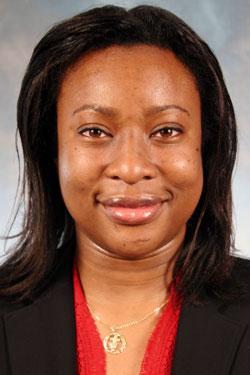PHSR Announces Transition in Graduate Program Leadership
Past director Francoise Pradel to remain closely involved with graduate program as responsibilities are transitioned to new director, Ebere Onukwugha.
By Malissa Carroll
July 2, 2013
As part of a planned leadership transition in the Department of Pharmaceutical Health Services Research (PHSR) at the University of Maryland School of Pharmacy, Ebere Onukwugha, MS, PhD, assistant professor in PHSR, assumed a new role as director of the PHSR graduate program on July 1. She follows Francoise Pradel, PhD, professor in PHSR, who served as the program’s director for two and a half years.
“Through her continued participation on numerous department, school, and campus-wide committees, Dr. Onukwugha has proven herself as an emerging leader within the department,” says Ilene Zuckerman, PharmD, PhD, professor and chair of PHSR. “Both she and Dr. Pradel are very student-centered individuals, which makes her the perfect choice to follow and build upon Dr. Pradel’s success as director of the PHSR graduate program. They have been working together to prepare for this transition for many months.”
As director of the PHSR graduate program, Pradel’s accomplishments have been numerous. Most recently, she oversaw the program’s successful completion of its external review.
“I have spent many wonderful years as director of the PHSR graduate program, and feel fortunate to have had the opportunity to work with such remarkable students and to be part of many important milestones, including our successful external review,” says Pradel. “Now, I’m looking forward to the many new opportunities I will have to engage with our students in the classroom and through potential research collaborations.”
A requirement for all doctorate programs within the University System of Maryland, the external review occurs once every seven years and consists of two parts: a thorough self-study and a comprehensive on-site visit. Pradel worked with Colleen Day, academic coordinator for the PHSR graduate program, to collect and organize program data for the internal self-study. She met with faculty throughout the department to collect feedback about the program’s strengths and weaknesses, and gathered insights from students to include in the report. The results, released in March 2013, indicated the PHSR graduate program to be “one of the best” of its kind in the nation.
“Dr. Pradel is not only an effective leader, but also a very caring and supportive friend to all of us in PHSR,” says Day. “Even though she served as director of the graduate program before I joined the department, I found that she was always open to suggestions and willing to learn from others’ experiences throughout the process.”
After stepping down as director of the PHSR graduate program, Pradel will focus on her roles as a professor and as the state evaluator of the Maryland Strategic Prevention Framework initiative that aims to reduce underage and binge drinking, and alcohol-related crashes in youth. She will also continue her involvement with the International Pharmaceutical Federation (FIP), for which she is recognized nationally and internationally and was elected as a member representative at-large to serve on the organization’s Executive Committee.
A member and former chair of the PHSR Admissions Committee and chair of the Pharmaceutical Research Computing center’s Advisory Board, Onukwugha joined PHSR in 2006. In her new role, she hopes to maintain the success that the PHSR graduate program experienced under Pradel’s leadership, while increasing its visibility on campus and across the region.
“It is important that our program continues to receive strong reviews similar to the external review in which we participated earlier this year,” says Onukwugha. “However, we also need to build on areas where there is potential for improvement. We need to look at our students and what they have accomplished to determine how we can better advertise their accomplishments and give them the recognition they deserve.”
Onukwugha is also interested in further promoting the interdisciplinary nature of the PHSR graduate program, particularly across the University of Maryland, Baltimore campus, which recently established a Center for Interprofessional Education to help students learn and work together across disciplines. She hopes to create a database of courses relevant to students across the Schools of Pharmacy, Medicine, Law, Social Work, Nursing, and Dentistry. “Currently, students find these courses almost by luck, which demonstrates a real need for a centralized database that will help students more quickly identify courses that are applicable across multiple disciplines,” says Onukwugha.
Other important issues that Onukwugha would like to address during her time as director of the PHSR graduate program include improvements in information sharing and graduate students’ quality of life.
“It is tough being a graduate student on many levels,” says Onukwugha. “However, I think there is a lot to be learned by talking to those students who balance their school and personal lives successfully. We can work with those students to develop some tools that we can share with our new students to help them succeed in the program as well.”



